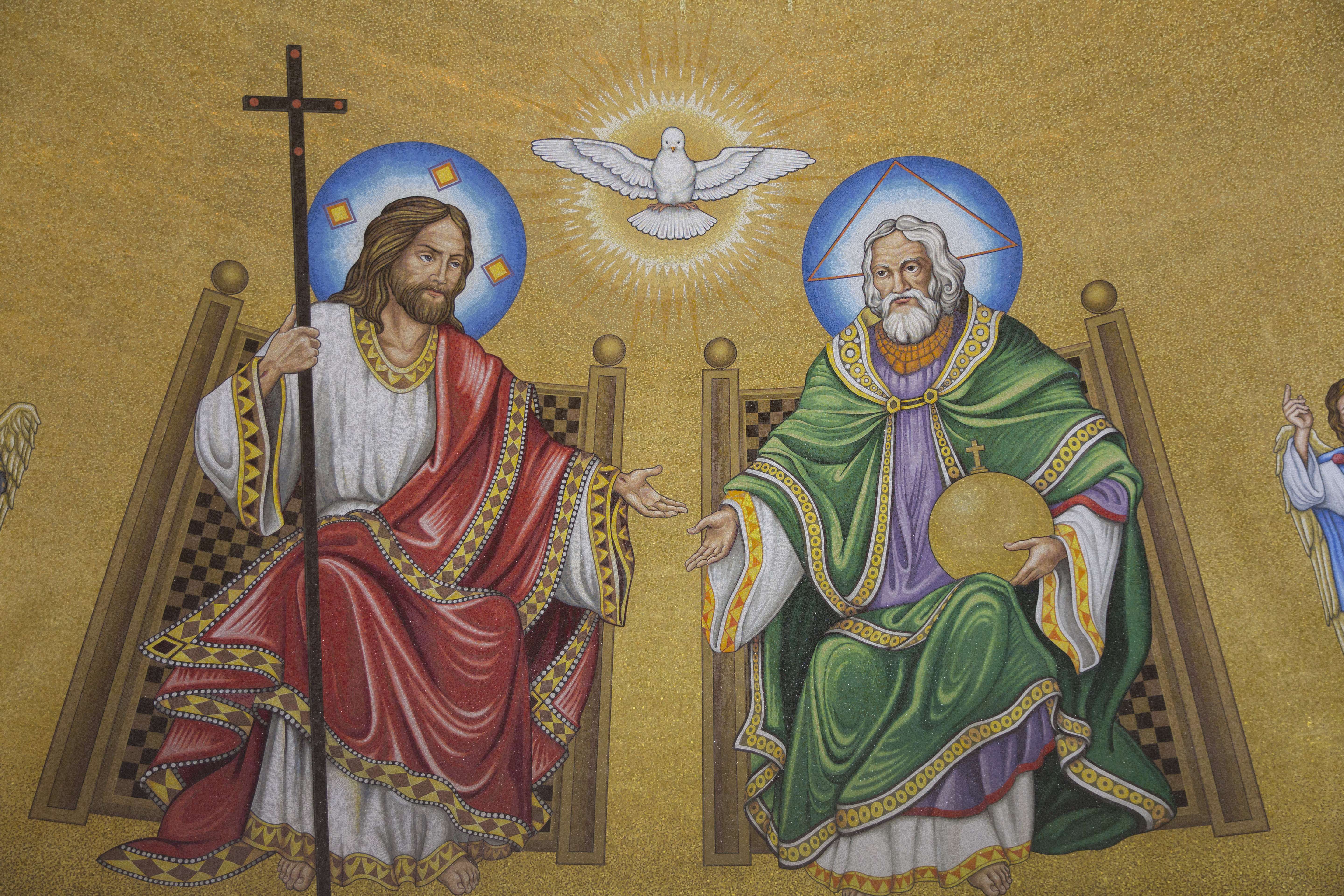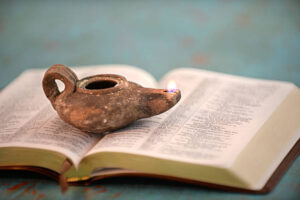Does the phrase, “Father, Son and Holy Spirit” provide evidence for the doctrine of the Trinity? Many Christians believe so. They cite primarily three passages[1] where the trio of names, or variations thereof, are mentioned in the same context. In this series, we’ll look at each of these proof texts to determine if they do indeed attest to the fourth century doctrine’s presence in Scripture.
If we’re going to discuss the doctrine of the Trinity, we need to know what it states. Not surprisingly, many Christians are confused as to what exactly constitutes this mystery of dogma.[2] The formal doctrine can be quite lengthy, so for our purposes we’ll use a summary of the Athanasian Creed (ca. 500).[3] The fundamentals of the doctrine state that the Father, Son and Holy Spirit are three distinct persons, each of which are said to be fully God. However, there is only one God because they are said to be consubstantial, that is, they share the same God-substance or essence. Furthermore, they are said to be co-equal in their divine nature or attributes (if one is holy, they are all holy, if one is omniscient, they are all omniscient, etc.), and are equally worthy of worship. Finally, they are said to be co-eternal and uncreated, each member having always existed.
What constitutes a Biblical doctrine?
The NAS New Testament Greek Lexicon states that a doctrine (Greek: didaskaliah) is “a teaching or instruction; that which is taught.”[4] In order for a doctrine to be Biblical it must actually be taught in the Bible. Thus, instead of asking if we can count three persons (Father, Son and Holy Spirit) in a passage, we need to ask, “Does this passage contain any teaching or instruction as to who God is and/or what the connection is between the Father, Son and Spirit?” For example, using the above definition of the doctrine, does the passage demonstrate at least one the following elements:
- the three persons are of one substance
- each person is fully God, yet there are not three Gods
- each person is co-equal
- each person is co-eternal
The text in question must do more than simply enumerate three persons as there are many verses that list a grouping of three. For instance: Abraham, Isaac and Jacob in Acts 7:8; Paul, Silas and Timothy in Acts 18:5; and Peter, James and John in Luke 9:28. Obviously, simply naming a three-member party does not constitute a Trinity.
The first passage we’ll examine in this series, and perhaps the one most often cited as proof of the Trinity, is found in Matthew’s gospel. It is commonly referred to as the “baptismal formula.” It is important to note that it is the only place in the entirety of Scripture to record such a formula. This glaring absence should raise a red flag.
Matthew 28:18-20 (NASB) And Jesus came up and spoke to them, saying, “All authority has been given to Me in heaven and on earth. 19 “Go therefore and make disciples of all the nations, baptizing them in the name of the Father and the Son and the Holy Spirit, 20 teaching them to observe all that I commanded you; and lo, I am with you always, even to the end of the age. (emphasis added)
Notice that the word “God” is not mentioned in this passage. It does not call the Father “God” or the Son “God” or the Holy Spirit “God.” Also note that it says nothing about their nature or any shared substance, nor does it tells us that even though there are three listed, they comprise only one God. Furthermore, the passage does not mention, much less teach, that they are each eternal, uncreated persons or that they share equally in the divine attributes and worship. Instead, the text implies that Jesus is “lesser than” because he was “given authority” as opposed to inherently possessing it. In addition, we aren’t told who or what the Spirit is. Is it a person? Is it a presence or a power? It doesn’t say. In fact, none of the key elements of the doctrine are addressed in this passage. Thus, Matthew 28:19 is not a valid proof text for the doctrine of the Trinity because it does not instruct or support the 4th century doctrine.
Some might draw attention to the fact that because the word “name” is singular, it must point to a unity between the Father, Son and Spirit. Yes, but in what way? The NASB Greek-Hebrew Dictionary states that “name” in this passage is also translated as “authority.” Given that the verse is about the delegated authority Jesus has received, it would be accurate to say that unity is a result of the now shared authority. Note, that there is nothing in the text about a divine substance, much less a shared one.
How were Christians baptized in the early Church?
Not only does Matthew 28:19 not contain any of the elements of the doctrine of the Trinity, we also see that the Bible never records anyone being baptized using the triadic formula. The book of Acts records nine instances where individuals or groups of people are baptized. Four of those instances provide us with specific details about the baptisms. However, none of them reference the baptismal formula Jesus supposedly commanded his disciples to use. For example, on the Day of Pentecost, a mere ten days after Jesus’ command was given, a Spirit-filled Peter failed to comply. Instead he instructed people to be baptized using only the name of Jesus Christ.
Acts 2:37-38 and 41 (NASB) Now when they heard this, they were pierced to the heart, and said to Peter and the rest of the apostles, “Brethren, what shall we do?” 38 Peter said to them, “Repent, and each of you be baptized in the name of Jesus Christ for the forgiveness of your sins; and you will receive the gift of the Holy Spirit… 41 So then, those who had received his word were baptized; and that day there were added about three thousand souls. (emphasis added)
Furthermore, Philip did not follow Jesus’ command when he baptized believers in Samaria. Like Peter, he baptized using only the name of Jesus:
Acts 8:12, 14-17 (NASB) But when they believed Philip preaching the good news about the kingdom of God and the name of Jesus Christ, they were being baptized, men and women alike…14 Now when the apostles in Jerusalem heard that Samaria had received the word of God, they sent them Peter and John, 15 who came down and prayed for them that they might receive the Holy Spirit. 16 For He had not yet fallen upon any of them; they had simply been baptized in the name of the Lord Jesus. 17 Then they began laying their hands on them, and they were receiving the Holy Spirit. (emphasis added)
Peter proved to be a repeat offender when he failed again to comply with Jesus’ directive in Caesarea:
Acts 10:46-48 (NASB) [Peter sharing gospel w/ Cornelius and his household in Caesarea ] 46 For they were hearing them speaking with tongues and exalting God. Then Peter answered, 47 “Surely no one can refuse the water for these to be baptized who have received the Holy Spirit just as we did, can he?” 48 And he ordered them to be baptized in the name of Jesus Christ. Then they asked him to stay on for a few days. (emphasis added)
In true New Testament fashion, the apostle Paul did not use the triadic formula either. Instead, he baptized new believers in Ephesus in the name of the Lord Jesus.
Acts 19:1 and 3-5 (NASB) It happened that while Apollos was at Corinth, Paul passed through the upper country and came to Ephesus, and found some disciples…3 And he said, “Into what then were you baptized?” And they said, “Into John’s baptism.” 4 Paul said, “John baptized with the baptism of repentance, telling the people to believe in Him who was coming after him, that is, in Jesus.” 5 When they heard this, they were baptized in the name of the Lord Jesus. (emphasis added)
Why is there a discrepancy?
Why did these God-fearing, Spirit-filled men seemingly disobey their Lord’s command? Does the historical record hold any answers? While there are no extant manuscripts of Matthew 28:19 that pre-date the Council of Nicaea (325 AD), nevertheless, there is a way to verify the veracity of the text by looking at how the Church Fathers quoted the passage. Eusebius, Bishop of Caesarea (264-340 AD), was a prolific writer who compiled the earliest history of the Church. He had access to New Testament manuscripts that were 200 years older than the ones now available to us. It’s interesting to note that whenever Eusebius quoted Matthew 28:19 he never quoted it as we know it today, that is with the Trinitarian formula. Rather, he quoted Jesus as saying the disciples were to baptize believers “in my name.”[5] It was not until after the Council of Nicaea, when Jesus was elevated to God-status, that Eusebius began to quote the verse with the triune formula.[6]
Biblical scholars weigh in.
If there is no other instance of the Trinitarian formula to be found in all of Scripture, and the record clearly states that those who were baptized were baptized only in the Jesus name, with no mention of the Father and the Spirit, what then are we to make of Matthew 28:19? Thankfully, this is a question that Biblical scholars have thoroughly researched. The conclusion reached by a wide consensus of scholars[7] is that the phrase “Father, Son and Holy Spirit” is a later addition to the text. Here are but some of the scholars who have gone on record:
Harry A. Wolfson, The Philosophy of the Church Fathers: Critical scholarship, on the whole, rejects the traditional attribution of the tripartite baptismal formula to Jesus and regards it as of later origin. Undoubtedly then the baptismal formula originally consisted of one part and it gradually developed into its tripartite form.[8]
Arthur Peake, Commentary on the Bible: The command to baptize into the threefold name is a late doctrinal expansion. Instead of the words “baptizing [them into the name of the Father, Son and Holy Spirit] we should probably read simply “into my name.”[9]
The Encyclopedia of Religion and Ethics: It is the central piece of evidence for the traditional [Trinitarian] view. If it were undisputed, this would, of course, be decisive, but its trustworthiness is impugned on grounds of textual criticism, literary criticism and historical criticism…The obvious explanation of the silence of the New Testament on the triune name, and the use of another formula (Jesus’ name) in Acts and Paul, is that this other formula was the earlier, and the triune formula is a later addition.[10]
The Tyndale New Testament Commentaries: It is often affirmed that the words in the name of the Father, and of the Son, and of the Holy Ghost are not the ipsissima verba [exact words] of Jesus, but…a later liturgical addition.[11]
Wilhelm Bousset in Kyrios Christos: The testimony for the wide distribution of the simple baptismal formula [in the Name of Jesus] down into the second century is so overwhelming that even in Matthew 28:19, the Trinitarian formula was later inserted.[12]
To use Matthew 28:19 as a proof of the doctrine of the Trinity is to ignore the lack of evidence for the doctrine in the text, as well as the glaring absence of the formula anywhere else in Scripture. Clearly, when the early Church baptized believers, it was in Jesus’ name to the exclusion of the Father and the Spirit. The full weight of scholarship is behind the belief that the formula, as we know it today, was an addition to Jesus’ original command. Unfortunately, the interpolation is now an accepted part of Christian orthodoxy and the “gold standard” for Trinitarian proof texts. We would do well to adhere to Scripture over tradition when it is discovered that the latter has deviated from the former.
Post-publication Note: There are alternate views as to why the Father, Son and Spirit appear in conjunction with baptism in Matthew 28:18. For example, Sean Finnegan posits that the text, as we know it, is authentic. You can read about his position here: https://restitutio.org/2018/04/25/is-matthew-28-19-a-forgery/
[1] Matthew 28:19; Matthew 3:16-17; 2 Corinthians 13:14
[2] Caleb Lindgren, “Evangelical’s Favorite Heresies Revisited by Researchers,” Christianity Today, September 28, 2016, accessed 05-8-19 https://www.christianitytoday.com/news/2016/september/evangelicals-favorite-heresies-state-of-theology-ligonier.html
[3] The Athanasian Creed is the first creed to give a fuller definition of the doctrine. You can read the creed at: Christ Reformed Church, The Athanasian Creed, accessed 5-9-19, https://www.crcna.org/welcome/beliefs/creeds/athanasian-creed
[4] NAS New Testament Greek Lexicon, BibleStudyTools.com, accessed 05-09-19 http://www.biblestudytools.com/lexicons/greek/nas/didaskalia.html
[5] A partial list of Eusebius’ quotes can be found at http://www.trinitytruth.org/matthew28_19addedtext.html
[6] Oneil Mcquick, The Voice, (Liberation International Ministries Publishing, 2005), p. 459.
[7] “The historical riddle is not solved by Matthew 28:19, since, according to a wide scholarly consensus, it is not an authentic saying of Jesus, not even an elaboration of a Jesus-saying on baptism.” The Anchor Bible Dictionary, David Noel Freedman, ed. (Yale University Press, 1992), Vol. 1, p. 585
[8] Harry A. Wolfson, The Philosophy of the Church Fathers, (1964), Vol. 1, p. 143.
[9] Arthur Peake, Commentary on the Bible, (1929), p. 723. Accessed 05-10-19, https://www.studylight.org/commentaries/pfc/matthew-28.html#16
[10] “Baptism (Early Christian),” The Encyclopedia of Religion and Ethics, James Hastings ed. (New York: Charles Scribner’s Sons, 1910) Vol. 2, p. 380
[11] TrinityTruth.org, accessed 5-19-19, http://www.trinitytruth.org/matthew28_19addedtext.html
[12] Wihelm Bousset, Kyrios Christos, A history of the belief in Christ from the beginnings of Christianity to Irenaeus, (Abingdon Press, 1970), p. 295




The book “The Original Matthew 28:19 Restored” currently sold in Amazon has plenty of proof that the original text was “in my name” rather that in the triune formula.
Thanks for commenting, George. It can certainly be helpful to have additional resources.
There seem to be some reasons to question the triadal text of Mt. 28:19. However, I think Sean Finnegan’s podcast on the question is a good look at the case for genuineness. https://restitutio.org/2018/04/25/is-matthew-28-19-a-forgery/
Assuming it to be genuine, what would the one name be that Father, Son, and Spirit go by? The baptisms in Acts were in the name of Jesus. If Father, Son, and Spirit were all subsumed under Yahweh, why is it not used? “In the name of” could just mean “by the authority of,” and since Jesus is God the Father’s authorized son and spokesman, baptizing in Jesus’ name is by the authority of God, and the authority of Jesus was demonstrated at his baptism by the visible sign of the Holy Spirit descending upon him while the Father audibly endorsed him. When Apollos was graduated from John’s baptism to baptism in Jesus’ name, he became aware of the accompanying ministry of the Holy Spirit (the spirit of the Father) and actually received the Holy Spirit — a characteristic difference between the old and new covenants. The Father’s promised gift of the Spirit was given to the risen Jesus to pour out upon the church.
If “authority” rather than “name” is not the answer, or at least the whole answer, might we find out what the “name” is in Mt. 28:19 by seeing what name was actually used in the Acts baptisms? The name “Jesus” (which is the name they used) means “Yahweh saves” or “Yahweh is salvation.” What better name to glorify the Father, who saves through his Son, and gives the gift of his spirit?
Therefore, perhaps an extended paraphrase something along these lines: “Go therefore and disciple all nations immersing them into the name [Jesus] of the Father (who chose the name for his Son that attributes salvation to the Father) and of the Son (whose name it is and through faith in whose resurrection Yahweh saves) and of the Holy Spirit ( who bears witness to the Son and is given to those who believe in the Son by the Father who promised to dwell by his spirit along with the Son in the hearts of those who believe). Thus, the name is Jesus, the name given by the Father to the Son and testified to by the Holy Spirit through signs, wonders, and the actual presence of the Father and Son in the hearts of believers through the Father’s own indwelling spirit.
Hi Rob,
While the purpose of the post was to demonstrate that Matthew 28:18 does not prove the doctrine of the Trinity, it naturally generates questions as to why the Father, Son and Spirit are mentioned in conjunction with baptism. Your thoughtful comments certainly address the matter, and I think your extended paraphrase is quite reasonable and well articulated!
As for Sean’s article, while I may not agree with all of his points, I do agree that he presents a good argument for the possible authenticity of Matthew 28:18 as we know it. It would be worth noting in my post as an alternative theory. So thanks for sharing it.
Thanks for stopping by the website.
Blessings!
“The Original Matthew 28:19 Restored”
Well, New Testament is under hard text criticism so it is imposible to say that some sentence was changed later. Early church was baptizing in Trinity formula https://www.catholic.com/tract/trinitarian-baptism
Two points I believe you overlooked in the article. First, your statement that the “early church” (i.e. post-biblical Church) was baptizing in the Trinity formula, is not historically correct. The Trinity doctrine was not developed until the late fourth century. Thus, the “early church” (post-Biblical Church) had no concept of a triune God. At best, the “early Church” (post-Biblical Church) baptized in the name of the Father, Son, and Holy Spirit. Most importantly, however, the first century Church did not use the formula as evidenced by the Biblical examples quoted in the article. Not one baptismal passage in Scripture uses that formula. I recommend following the example that the first century Church provides instead of post-Biblical developments.
Second, the use of the phrase “Father, Son, and Holy Spirit” by the post-Biblical Church in the second century is not proof of the doctrine of the Trinity, especially since the doctrine had yet to be developed. Respected Biblical scholars, even Trinitarian ones like those quoted in the article, admit the phrase is a post-Biblical addition.
Blessings,
OGW
In researching this topic i saw a list of 60 NT that have the short version of 28, 19 now i can’t find it, can you point the way thanks
Greetings Marcos! I cannot immediately recall at site that lists 60 NT translations for the short version. But let me know if you find it as it sounds like a good resource.
Blessings,
OGW